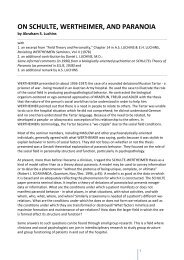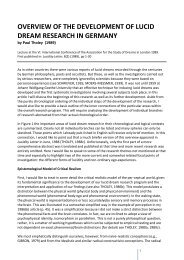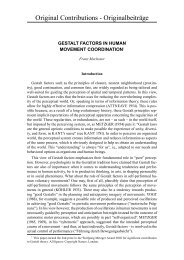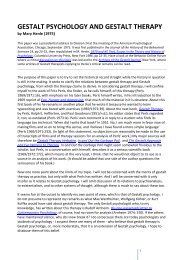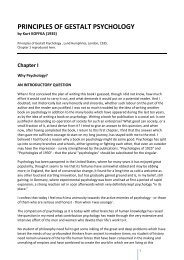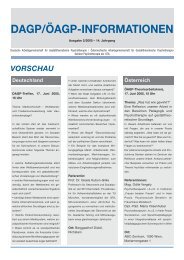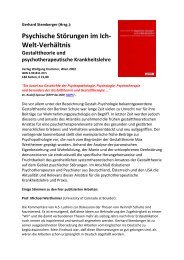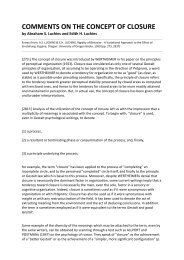pdf-Download - Society for Gestalt Theory and its Applications (GTA)
pdf-Download - Society for Gestalt Theory and its Applications (GTA)
pdf-Download - Society for Gestalt Theory and its Applications (GTA)
You also want an ePaper? Increase the reach of your titles
YUMPU automatically turns print PDFs into web optimized ePapers that Google loves.
(morphogenesis), but also <strong>for</strong> the productive psychic processes. Apparently, they do not take their<br />
energy from the external surroundings, like the whole organism, but rather from the psychic<br />
surrounding field, from the psychic neighboring systems, so that, in the limit case of a (sound)<br />
obsession by a (scientific, artistic, technological, organizational) problem, these neighboring<br />
systems may become deprived of energy <strong>and</strong> the respective man, as it were, "consumes himself"<br />
(W. KÖHLER). In other words, during these processes, the dynamics of the gratification of<br />
elementary needs may become more or less <strong>and</strong>, at least <strong>for</strong> a certain time, the less significant<br />
one.<br />
This dynamic approach to the relation between the situation <strong>and</strong> reaction allows clarification not<br />
only of the facts which were already explained in another way by behaviourism, but also of two<br />
basic psychological facts which were not explained by behaviourism: finality <strong>and</strong> productivity.<br />
The fact that this not so simple idea was founded on the basis of both objective (von<br />
BERTALANFFY, von HOLST) <strong>and</strong> subjective data (KÖHLER, WERTHEIMER) indicates that the denial<br />
of scientific usefulness of subjective data (the first principle of behaviourism) was aparently based<br />
on insufficient facts. By the way, both "subjective data" (Sign-gestalt) <strong>and</strong> finality is admitted in the<br />
"purposive behaviourism" (TOLMAN, 1932).<br />
9. On the <strong>Theory</strong> of Learning by Success<br />
According to the behaviouristic theory of learning, it may be ascertained only on the basis of a<br />
success arrived at already whether some behaviour approaches the goal or not (if there are no<br />
previously acquired mechanisms or behaviour patterns).<br />
But, there are certain problem situations, natural or deliberately introduced, which are so<br />
accidental or so unclear that there is no other possibility in coping with them but <strong>for</strong> the classical<br />
active conditioning. However, here the question arises as to whether the conditioning may serve<br />
as a model <strong>for</strong> all possible problem solving processes. If this should be correct, then the basic<br />
principle would be as follows: There is no primary finality in the behaviour of living beings. This<br />
thesis cannot bs valid, as was demonstrated in the preceding paragraph. Wolfgang KÖHLER in his<br />
intelligence tests of anthropoids was successful in 1917 in proving the primarily goal-centered<br />
behaviour in new situations without any ready behavioural patterns available. As to the primary<br />
finality of the productive mental processes of man, see, first of all, Max WERTHEIMER, 1945.<br />
The constantly reappearing assertion that the insightful solving of problems occurs "in reality"<br />
through trial <strong>and</strong> error, <strong>and</strong> that it is only transferred from exterior to interior (to imagination, or,<br />
in the behaviouristic nomenclature, on the "hidden level") has never been proven as yet <strong>and</strong>,<br />
preserving the principle of objectivity, cannot be proven at all.<br />
Replacing overt trials by the assumption of "internal" attempts, "preceding" the external<br />
behaviour, misses the essential. First, if a person decides to go to the right around a big round<br />
table to reach his goal <strong>and</strong> not to the left, he does not need to try both possibilities in his<br />
imagination in order to find out that it takes a couple of steps less if he goes to the right. Rather,<br />
he can observe in his surrounding world that the way to the right is shorter. Second, even<br />
intelligent problem solving is often not possible without (external) attempts. However (<strong>and</strong> this is<br />
the decisive point), whereas according to learning theory, one of the attempted activities must<br />
have already succeeded in order to be recognized, accepted <strong>and</strong> memorized as useful, in reality,<br />
<strong>for</strong> an intelligent, primarily goal-centered activity it is characteristic that it displays choice of<br />
11



